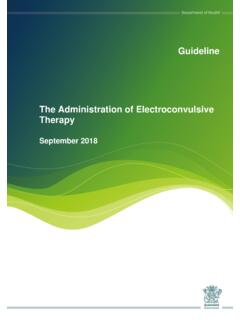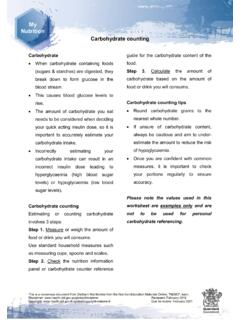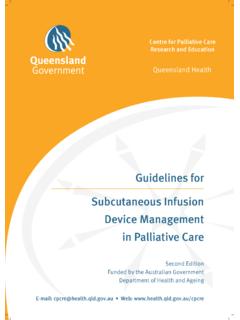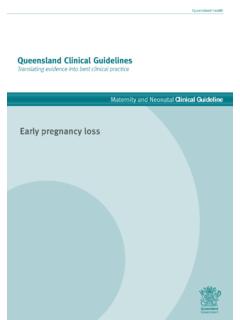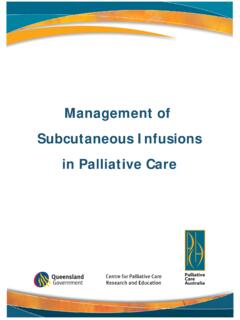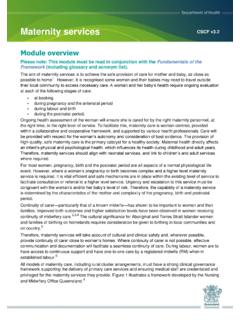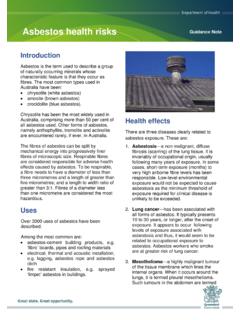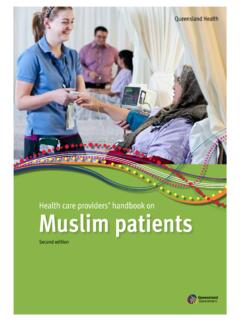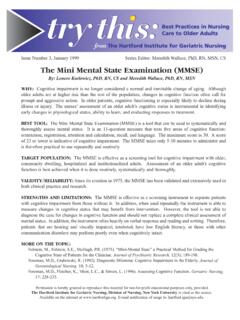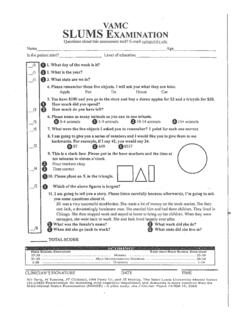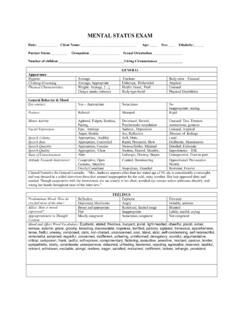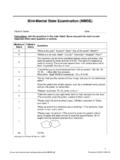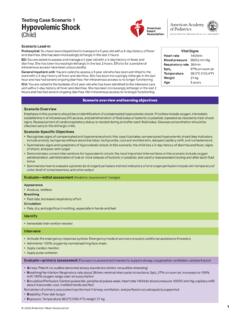Transcription of Caring for a person with Dimentia - Queensland Health
1 Page 31 Caring for a person withDementiaCase studyHarry is an 85 year old man who has been brought to hospital following a fall from a ladder in his back yard. He lives with his wife, Alice, in their own home. He had been attempting to clean out the gutters following a storm. He is not sure how he got to hospital and is not good at providing other Health or family history. On a mini mental status Examination he scored 17 out of 30, which is well under the cut-off score of 24. This indicates that he has possible cognitive impairment. His dislocated shoulder has been reduced under anaesthesia following two unsuccessful attempts at closed has not eaten or taken any fluids since returning to the ward. You become concerned that when his wife leaves after the evening meal, he becomes restless and begins to experience difficulty responding to following information could help you nurse a patient like is dementia?Dementia is the term used to describe the symptoms of a large group of illnesses that cause a progressive decline in a person s functioning.
2 It is a broad term used to describe a loss of memory, intellect, rationality and social skills. It is estimated that dementia affects per cent of all Australians aged 65 and over. Symptoms and types of dementiaIn the early stages of dementia, people function relatively normally with some support. As dementia progresses, more specific symptoms occur (such as difficulty with speech and language, poor judgement and lack of insight). Difficulty with personal care tasks (such as bathing) and other everyday tasks (such as cooking, shopping and managing money) may become apparent. Often there are enduring changes in personality and behaviour as with dementia can be perceived to be aggressive, uncooperative and unpredictable. They may also present with hallucinations and delusions. These behaviours of concern and others can best be classified as behavioural and psychological symptoms of dementia . All the signs and symptoms are a result of progressive damage to the brain.
3 For example, damage to the limbic system is associated with memory dysfunction, unstable mood and personality changes. The behaviours are not the result of deliberate attempts to be difficult or to upset can be caused by a number of disease processes. Approximately 60 per cent of people with dementia have Alzheimer s disease and about 20 Page 31 Page 32 Dementiaper cent have vascular dementia. Dementia related to Parkinson s disease is also common, and excessive alcohol consumption is another prevalent cause. Other illnesses (such as multiple sclerosis, HIV/AIDS, Huntington s disease and Creutzfeldt-Jacob disease) are less common and course of dementiaIn Alzheimer s disease, the onset is insidious, generally occurring after the age of 55 and increasing in frequency of occurrence with advancing age. Dementia is a terminal illness, and failing brain function and increasing physical disability lead to total dependence on others for all care.
4 Palliative care measures towards the end of life are appropriate for people with in diagnosisIt is important to understand the difference between dementia, delirium and depression. Depression and delirium are treatable conditions that present similar to dementia. Remember that all three conditions can be present and that dementia increases the risk for delirium. Common precipitating factors for delirium include infection, medication interactions and between dementia, delirium and depression and (the three Ds) requires skilled assessment. The differences and similarities are outlined in Table 1. Be alert to co-morbid substance misuse as complex co-morbidities may mask substance misuse and the impact of co-occurring 1 The features of dementia, delirium and depression Page 32 DementiaDeliriumDepressionThoughts Repetitiveness of thought Reduced interests Difficulty making logical connections Slow processing of thoughts Bizarre and vivid thoughts Frightening thoughts and ideas Often paranoid thoughts Often slowed thought processes May be preoccupied by sadness and hopelessness Negative thoughts about self Reduced interestSleep Often a disturbed 24 hour clock mechanism (later in the disease process) Confusion disturbs sleep (may have a reverse sleep-wake cycle) Nocturnal confusion Vivid and disturbing nightmares Early morning waking or intermittent sleeping patterns (in atypical cases, too much sleep)
5 Orientation Increasingly impaired sense of time and place Fluctuating impairment of sense of time, place and person Usually normalOnset Usually gradual, over several years Insidious in nature Acute or subacute (hours or days) Usually over days or weeks May coincide with life changesMemory and Cognition Impaired recent memory As disease progresses, long term memory also affected Other cognitive deficits such as in word finding, judgement and abstract thinking Immediate memory impaired Attention and concentration impaired Recent memory sometimes impaired Long-term memory generally intact Patchy memory loss Poor attentionDuration Months or years and progressive degeneration Usually brief hours to days (but can last months in some cases) At least two weeks (but can be several months to years)Course throughout a day May be variable depending on type of dementia Fluctuates usually worse at night in the dark May have lucid periods Commonly worse in the morning with improvement as the day continuesAlertness Usually normal Fluctuates lethargic or hypervigilant NormalOther May be able to conceal or compensate for deficits (early) May occur as a consequence of a drug interaction or reaction, physical disease, psychological issue or environmental changes Often masked May or may not have past history(NSW Department of Health , 2006)DementiaSome reported reactions to people with dementiaNurses who have worked with people with dementia have reported the following reactions.
6 Frustration and This results from lack of improvement in a person with irreversiblehelplessness symptoms, as well as the constant need to repeat instructions, break down tasks step-by-step and answer repetitive Nurses report decreased patience and tolerance in providing care when people with dementia are negative, hostile, impulsive or slow to People with dementia may show little insight into their loss of ability, and this can be interpreted as choosing not to accept help or being resistive to care. This can lead to feelings of anger in for nursing a person with dementiaAppropriate goals for Caring for a person with dementia in a community or hospital setting include: u Develop a relationship with the person based on empathy and Provide an environment that supports a flexible but predictable Maintain a safe environment for the person , yourself and other Promote the person s engagement with their social and suppor t Ensure effective collaboration with other relevant ser vice providers, through development of effective working relationships and Suppor t and promote self care activities for families and carers of the person with dementia.
7 Guidelines for responding to a person with dementiaThe following guidelines will assist in nursing a person with dementia. u Arrange for a review of the person s medication and an initial or follow-up psychiatric assessment if their care plan needs reviewing. A mental Health assessment may be appropriate to undertake see the MIND Essentials resource What is a mental Health assessment? .u A person s cultural background can influence the way symptoms of mental illness are expressed or understood. It is essential to take this into account when formulating diagnosis and care plans. Indigenous mental Health workers or multicultural mental Health coordinators and the Transcultural Clinical Consultation Ser vice from Queensland Transcultural mental Health Centre are available for advice and assistance in understanding these issues. For fur ther information please visit Page 33A perspective on being the partner of a person with dementia My wife s dementia was insidious.
8 It snuck up on us slowly and then took over every aspect of our life, requiring her to be cared for in a nursing home. She became extremely scared and anxious and everyday when I left the nursing home she would cry out don t leave me. It was heartwrenching to leave her but even more distressing to know that ten minutes after leaving, she wouldn t even remember that I had been there with her. I felt helpless watching her decline. Page 34 Dementiau Explain to the person who you are, what you want to do and Smile the person is likely to take cues from you, and will mirror your relaxed and positive body language and tone of Move slowly, you may have a lot to do and be in a hurr y, but the person is not. Imagine how you would feel if someone came into your bedroom, pulled back your blankets and star ted pulling you out of bed without even giving you time to wake up If the person is resistant or aggressive but is not causing harm, leave him or her alone.
9 Give the person time to settle down and approach the task Distract the person by talking about things he or she enjoyed in the past, and by giving him or her a face washer or something to hold while you are providing Do not argue with the person . The brain of a person with dementia tells the person that he or she cannot be If the person is agitated, maintain a quiet environment. Check noise levels regularly and reduce them if necessar y by turning off the radio and Provide orientating cues such as a clock and Give the person a comfor table space. Any activity that involves invasion of personal space increases the risk of assault and Always provide care from the side (not the front) of the person . If you stand in front, you are easily hit or kicked if the person becomes Be vigilant if the person is climbing out of bed. Refer to your workplace policy on restraint. If you cannot work out a reason for this behaviour, you might walk with the person or engage him or her in an activity.
10 This helps to maintain his or her mobility, and eventually he or she may tire and go back to bed. Encourage family or volunteers to help with Monitor compliance with medication and general physical Health (including nutrition, weight, blood pressure, etc).u Monitor food and fluid intake and elimination dehydration or constipation can exacerbate People with dementia are at increased risk of developing delirium, so be aware of risk factors for delirium (such as medication interactions, infection and the postoperative period). u Provide family members and carers with information about the illness if appropriate, as well as reassure and validate their experiences with the person . Encourage family members and carers to look af ter themselves and seek suppor t if Be aware of your own feelings when nursing a patient with dementia. Arrange for debriefing for yourself or any colleague who may need support or assistance this may occur with a clinical super visor or an Employee Assistance Ser vice 34 The Employee Assistance Service provides confidential, short-term counselling free-of-charge to Queensland Health staff to assist them to resolve personal and work related problems.
